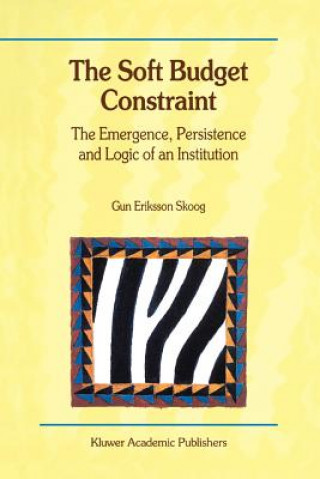
Doručenie
Nákupný poradca





Nehodí sa? Žiadny problém! U nás môžete do 30 dní vrátiť
 Darčekový poukaz
v ľubovoľnej hodnote
Darčekový poukaz
v ľubovoľnej hodnote
S darčekovým poukazom nešliapnete vedľa. Obdarovaný si za darčekový poukaz môže vybrať čokoľvek z našej ponuky.
Soft Budget Constraint - The Emergence, Persistence and Logic of an Institution
 Angličtina
Angličtina
 467 b
467 b
30 dní na vrátenie tovaru
Mohlo by vás tiež zaujímať


The soft budget constraint - today a popular metaphor - is a paradox. In socialist economies, it implies that the state tends to bail out state-owned firms in financial trouble, in spite of the tremendous performance problems of the entire system that result. When the socialist system broke down, the soft budget constraint was expected to disappear. However, it seems to persist, and its persistence appears to hamper the transition process itself. The Soft Budget Constraint The Emergence, Persistence and Logic of an Institution seeks an answer to this paradox. It aims at increasing our understanding of why the soft budget constraint exists. By investigating state-owned enterprises in Tanzania before, during and after socialism, the prevalence of the soft budget constraint is examined and an explanation of its existence is suggested. The approach is institutional. The soft budget constraint is defined as an informal institution and an invisible-hand explanation of its emergence, persistence and logic is applied. The book shows that the soft budget constraint emerged as an unintended consequence of the establishment of the Tanzania socialist system in the 1970s. A behavioral solution to recurrent systemic problems was offered, and thus the soft budget constraint performed several functions. Once established, its very existence set off a cumulative process of self-generation. Four reinforcement mechanisms that accounted for its maintenance during Tanzanian socialism are identified. Its character as an informal rule helps to explain why it persisted during market-oriented reform, initiated in the mid-1980s. The soft budget constraint was part of the socialist heritage, was adapted to systemic change, and influenced the direction and character of this change.
Informácie o knihe
 Angličtina
Angličtina




 Ako nakupovať
Ako nakupovať























